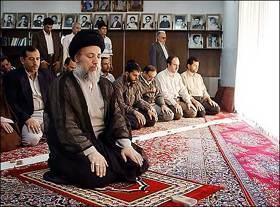 |
 |
| SCOTT PETERSON / GETTY IMAGES, 2002 |
| Ayatollah Mohammed Bakr Hakim leads the Supreme Council for the Islamic Revolution in Iraq. |
 |
THE EXILES
Six main opposition groups are jockeying for power in a post-Saddam Iraq.
About 300 leaders of the Iraqi opposition in exile scheduled a November meeting in Brussels, Belgium, to plan a nation free of Saddam Hussein.
The meeting had to be postponed a month when the fractious groups that represent a rainbow of ethnic, religious and political interests couldn't agree on either an agenda or how many and who should attend.
The squabbling has led critics to contend that not only is there no one capable of leading the country if Saddam's Baath Socialist Party is no longer in power, but also that the U.S. military would have to remain there long after an overthrow.
There are six main organizations vying from afar for power.
The Iraqi National Congress, led by a U.S.-trained businessman, Ahmed Chalabi, is perhaps the most powerful. The Bush administration recently approved $92 million to provide combat training for Iraqi exiles, many of whom would be chosen by the INC.
The INC includes many of the bureaucrats, entrepreneurs, engineers and professionals Iraq will need to run its affairs post-Saddam and is expected to provide intermediaries for a U.S. government trying to rebuild a postwar Iraq. It also is credited with attempting to include Iraqi minorities living in exile in its plan.
But, while Chalabi has wide support in Congress and at the Pentagon, he is regarded with skepticism by others in government. Chalabi's critics question his ethics because he was convicted in absentia for bank fraud in Jordan in 1992. Chalabi has called that a political setup.
Chalabi, who has advanced degrees in mathematics from the University of Chicago and MIT, comes from an elite Shiite family.
The Supreme Council of the Islamic Revolution of Iraq is a resistance group founded in 1982 by southern Iraq's beleaguered Shiites. Their leader is Ayatollah Mohammed Bakr Hakim.
The Kurdistan Democratic Party is one of two Kurdish groups that have exercised quasi-autonomy in northern Iraq. It is led by Massoud Barzani, the son of Mullah Mustafa Barzani, who helped establish Kurdish nationalism and is considered a great Kurd patriot.
The Patriotic Union of Kurdistan, the other Kurdish group, is led by Jalal Talabani, who controls the eastern Kurdish regions along Iraq's border with Iran. The two Kurdish parties recently put aside their differences, saying they want a democracy based on federalism with the Kurdish regions recognized as autonomous.
The Iraqi Constitutional Monarchy Movement is led by Sharif Ali bin Hussein, heir to Iraq's onetime throne.
The monarchy was installed in Iraq by the British, who controlled the region after World War I. The family was deposed in 1958 after the military killed bin Hussein's relatives, King Faisal II and Crown Prince Abdullah and other royalty.
The Iraqi National Accord, consisting mostly of defectors from Saddam's Baath party and the Iraqi military, is led by Iyad Allawi.
Allawi was a rising star in the Baath party with Saddam, who was forced into exile. He worked for the World Health Organization and in private business.



